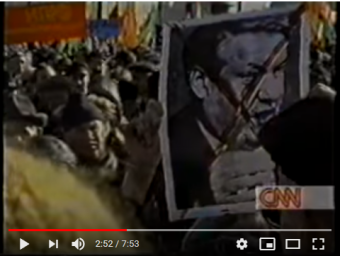“Yeltsin Resign already 1998," Oct. 7, 1998 mass demonstrations against Yeltsin in Russia, posted May 1, 2007 on You Tube. Audio includes clips of news accounts from around the world. Above is screen shot from You Tube video.
At 2:11: (US announcer): “Seeking an end to President Boris Yeltsin’s 7 year rule. Thousands of citizens have gone for weeks even months without being paid. The Russian government is appealing.”…
At 2:48: (English speaking announcer): “Communists and trade unions who organized the protest were demanding payment of back wages and the resignation of President Boris Yeltsin.”…
At 3:50: “Their anger at the government’s failure to come up with long unpaid wages.”
At 5:31: (Translation of Russian woman protester): “I’m here because I was robbed by this regime. I have nothing left. It’s all because of Yeltsin and his government of young bandits.”

Above, anti-Yeltsin sign, screen shot from video, 10/7/1998
……………………………..
Added: “Millions of Russians from coal miners and soldiers to doctors and nuclear scientists have to wait months for their meager wages because of a chronic shortage of state funds.”
Oct. 7, 1998, “Russians start anti-Yeltsin protests,” CNN, Vladivostok, Russia
“Millions of Russians from coal miners and soldiers to doctors and nuclear scientists have to wait months for their meager wages because of a chronic shortage of state funds and a complex web of debt straddling both public and private sectors….
[Prime Minister] Primakov asks for calm in television address
On the eve of the protests, Prime Minister Yevgeny Primakov made a nationally televised appeal to Russians to remain calm, both during the demonstrations and for the duration of the economic crisis.
Primakov promised there would be no food shortages this winter and said the government would start paying overdue wages and pensions.
“The populace will be fully provided with vegetables, fruit and potatoes,” Primakov said. “I appeal to everyone not to rock our common boat in today’s too-turbulent sea.”
But the protesters are not demanding Primakov’s resignation. Unlike Yeltsin, the former spymaster and foreign minister still enjoys strong public approval, according to opinion surveys.
His espousal of more measured reforms, including more help for the poor and for industry, has struck a chord among Russians dismayed by the post-communist gulf between haves and have-nots.
Many regional governors like Vladivostok’s Yevgeny Nazdratenko, actively courted by Primakov, also approve of Primakov while generally backing Wednesday’s planned protests.
Trust of the people, trust of the creditors
Primakov faces a tougher task winning the trust of global creditors, still reeling from the previous Cabinet’s decision on August 17 to default on some foreign debt repayments, devalue the ruble and unilaterally restructure the GKO short-term domestic debt market.
On Tuesday Finance Minister Mikhail Zadornov, locked in tough talks in Washington with the International Monetary Fund, vowed Russia would pay $3.2 billion in foreign debt owed by the end of 1998.
Zadornov, a liberal, said the new government would present a new tax program to parliament this month and that he expected the ruble to trade at around 20 to 23 to the dollar until the end of this year, well below the current rate of around 15.8.
Before its devaluation one dollar bought about six rubles….
One new element in Wednesday’s protests may be the pain that has hit Moscow’s embryonic white-collar middle class, hundreds of thousands of whom have lost well-paid jobs in recent weeks.
In Yeltsin’s home city of Yekaterinburg in the Urals, off-duty police officers are also due to join the marchers to demand overdue wages.”…
...............


No comments:
Post a Comment